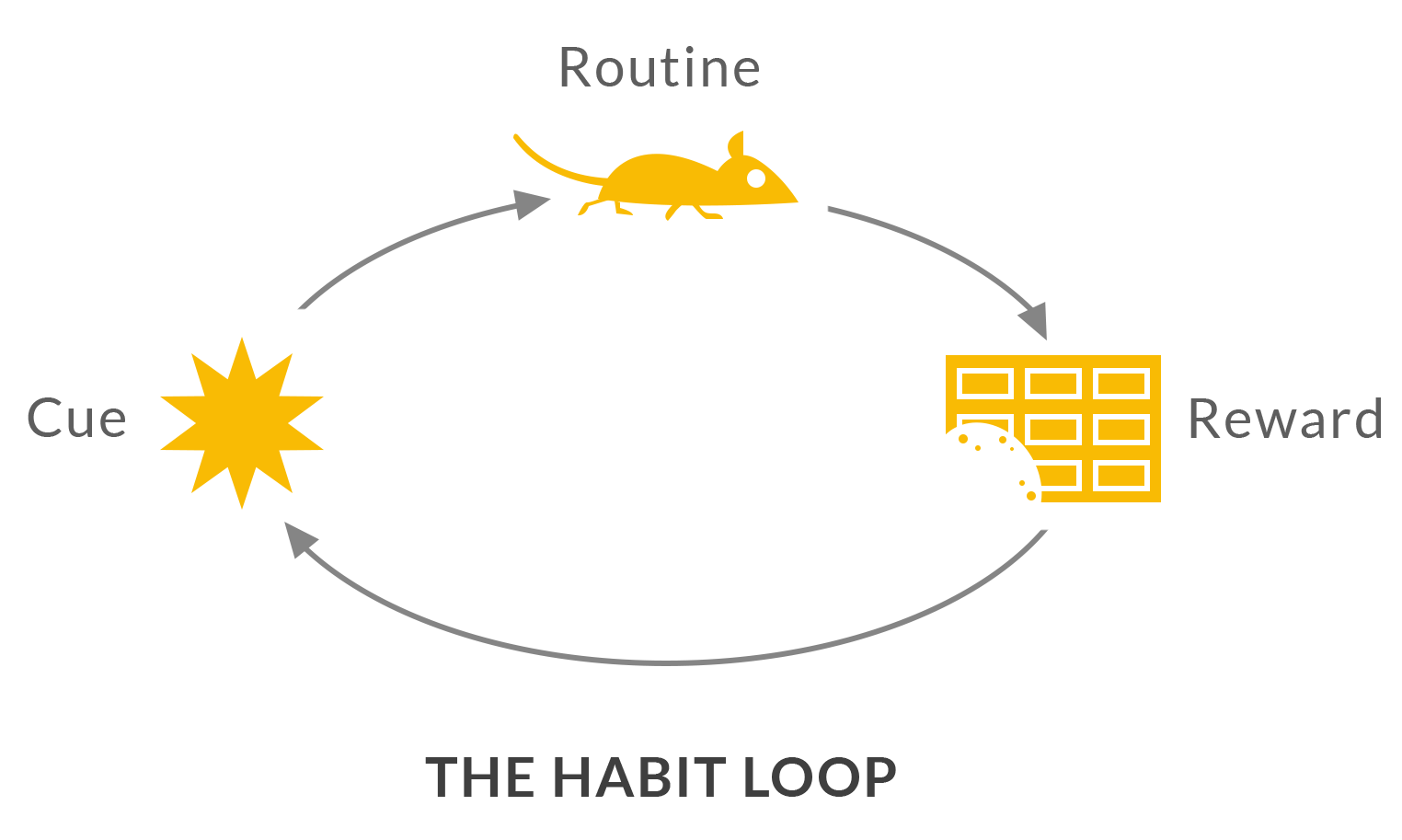Interview with Chalz Dahigg: how strength of habit can help you achieve your goals

Earlier, we introduced you to the translations of Chris Bailey articles, which he wrote as his project a Year of Productivity developed - they are available in our blog in the “ personal productivity ” section.
In addition, Chris is also the author of the guide, whose goal is to help people achieve their “New Year goals”. Many of us on New Year's Eve think that a good and useful thing happened last year and what we would like to achieve in the future. In his guide, Chris collected useful tips from previous articles, talked to many interesting people and asked them the question: "How to achieve your New Year's goals?"
')
Today we would like to share one of these interviews - Chris talked with Charles Dahigg, author of the famous book “The Power of Habit”. Charles believes that the formation of good habits is one of the main parameters for achieving the goal.
So we give the word to Chris!
Recently, I had the opportunity to interview Charles Dahigg on how to use your habits to better achieve your New Year's goals. Charles is a Pulitzer Prize-winning New York Times reporter and author of The Power of Habit. The book version today is widely available on the bookshelves.
After you set goals for the new year, it is absolutely necessary to acquire good habits if you want to keep your New Year promises. Working habits determine how productive you can be, dietary habits — how healthy you become, habits of training — how many kilograms of weight you can lose or gain, and habits in general determine how you live your life. In fact, according to Charles Dahigg, the author of The Power of Habit, at least “40-45% of our daily activities are habits,” which means that “if you don’t take care of the right habits, you won’t reach your goals.” .
"Loop habits"
In our conversation, Dahigg said that each habit can be broken into three components. “First, a stimulator / stimulus is triggered, which is a trigger for automatic behavior, then the habitual behavior itself and, finally, a reward.” In confirmation of this, a lot of neurological studies have been conducted. “When the stimulus, behavior, and reward for the nervous system become linked to each other, a neural chain is formed that connects these three things in our head.” That is why habits are so stable, and that is why it is so difficult to break bad habits.

Although it is difficult to get rid of the habit (research has shown that it is much easier to change the old habit, instead of trying to eradicate it), you can use a scientific approach to introduce new habits into your life or change existing programmed behavior that you are tired of.
Here's how to do both.
Personally, I think this: the first thing you need to do after you set a New Year's goal is to transform it into a habit. For example, instead of a goal to train more, form the habit of walking on a 15-minute walk to the coffee shop and back every time when lunch time comes up. Or, instead of deciding to lose weight, decide to replace your morning latte coffee with sugar with green tea.
Of course, easier said than done, so I asked Charles how to form a new habit. He replied that he needed to find some “stimulant stimuli” that would trigger the habit, and then reward yourself after you perform the action itself.
1. Find a few stimulants.
To instill in himself a new habit, Dahigg recommends “to think carefully about the stimulants and rewards you want to see in your life that will encourage you to behave in the right way.”
According to Charles, stimulants that trigger a sequence of habit elements fall into one of five categories:
1. Specific time of day
2. Specific location
3. The presence of certain people
4. Certain emotion
5. The action that took the form of a ritual
Dahigg recommends introducing into his life several stimulants from several categories of triggers. “In the end, your brain will catch on to one of them, but you need to give it a choice.”
This is easiest to illustrate with an example of a New Year's decision to exercise more. "For example, you put your jogging uniform next to your bed to see it when you wake up, and you agree with one of your best friends to go jogging on Wednesday at 8.30 in the morning." In this example, there are several triggers - the time of day, the place and presence of certain people.
2. Reward yourself
After you have identified several stimulants that will trigger your new habit, you need to decide how you will reward yourself for doing the right thing.
Charles touched on how difficult it is to embed a new behavior in his everyday life. “Even if you think you want to start exercising, your brain thinks that you are a liar and that in reality you don’t like to exercise. Therefore, you need to teach your brain to the fact that training is related to something that you like, for example, a piece of chocolate, a long pleasant soul or 15 minutes on Facebook. No matter what the reward is, the main thing is that it is really pleasant for you and that you allow yourself to it.
“Now compare this approach with how most people begin to train. One morning, they wake up and go for a run, then return home and are late, because they have just spent 20 minutes for a run, and children need to be gathered in kindergarten / school, and now they are doing their daily routine in stress and bustle. It turns out that they punish themselves for training. After training, everything becomes more complicated, and this is the wrong approach, because we know that our nervous system is focused on rewards. ” Everything needs to be done gradually: for example, if you think that you need to work more in the new year, you should not immediately start working 90 hours a week , instead of the usual 40.
You need to strengthen the link between the stimulant, the action and the reward in your head. For example, Dahigg suggested the following: “When you start training and return home after training or jogging, eat a small piece of chocolate.” At first glance, this may seem like a paradoxical piece of advice, but since the reward is so good at helping you to fix the habit, this is, without doubt, sensible advice in the long run.
After you have determined the stimulants that will trigger the sequence of habits, and the correct reward, after a while you will find that you have to spend less time and apply less willpower to stick to your decision. Although you may need patience in shaping new habits, the right stimulants and reward-giving rewards will lead to the fact that over time the right behavior will become more and more easily executable and automatic.
Do not try to eradicate old habits - better change them
In the book “The Power of Habit”, Dahigg says that it is possible to burn, trying to overpower yourself and force to fulfill promises with the help of will power. Willpower is one of your most valuable resources, and many studies have revealed that it can be depleted, which is why it is so important to form automatic habits. Instead of trying to eradicate the old habit, Dahigg recommends changing it, which is much simpler and leads to greater success.
“As the reward stimulates the release of more neurotransmitters, the neural connections become stronger and more durable, and the corresponding impulses are more easily transmitted along the desired trajectory. Therefore, when someone tries to eradicate the habit, he, in fact, tries to destroy the neural path by will power. It's quite difficult to change your brain. ”
Just as in order to adapt a new habit, to change the old one, you need to start with the definition of a stimulant and reward, but at the same time “find a new behavior that will be associated with them” (new action). Dahigg recommends that the stimulant and the reward be as simple as possible because habits can be very firmly rooted in the brain.
Stimulants are fairly simple to determine (since they fall into one of the above categories), it is more difficult to determine the rewards. For example, you have the habit of approaching a vending machine at work every morning. Your stimulator is probably the time of day, but it’s more difficult to determine the exact reward. For example, you are drawn to food because you are hungry? Or do you want to take a break from work, and, perhaps, somehow diversify your morning? In this case, the theory of “tasks to be done” works - think about why you need to perform an action, and whether you need to perform it at all at the moment.
According to Charles, “Once you have found a reward, you can change your behavior.” In this particular example, depending on your reward, you can eat an apple if you are hungry, or take a walk outside if you need a break, or sit on Facebook for 15 minutes if you want some news. ”
Once you have decided on a deep reward, you can be sure that “the stimulator and the reward remain the same” and that “only the behavior really changes”.

Be prepared for difficulties
According to Charles, one of the important points in the process of creating new habits is “being prepared for crises” and the obstacles that you may encounter on the way to goals.
"Very often, people start to train, and then one day at the end of the month they are almost going to go for a run, and then
something unexpected happens, for example, they go on a trip. Maybe they forgot to bring their clothes for jogging or at the hotel it’s difficult to decide where to go for a run. You do not know where the nearest gym. And these small obstacles become big obstacles, and suddenly the pattern of behavior falls apart and it is no longer returned. ”
“It is often easy to cope with an obstacle in advance and difficult when faced with it in the present moment. Studies have shown that when you use a noose of habits and are ready for difficulties, you are more likely to develop a new habit. ”
Act thoughtfully
At the end of the interview, when I asked Charles Dahigg what secret of productivity he would share in the new year, he told about the importance of analyzing and understanding how everything works in life. “The truth is that every day we do a lot of things that we don’t pay attention to, and that’s good because it doesn’t burden the mind.” On the other hand, “a better understanding of what controls your behavior really allows you to change this behavior, and this has a significant impact on how you change from day to day.
Understanding your habits, without a doubt, is one of the best ways to begin to better understand and control what drives your behavior in the New Year.
Successes!
Source: https://habr.com/ru/post/245281/
All Articles